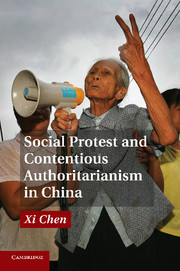Book contents
1 - Introduction
Published online by Cambridge University Press: 05 December 2011
Summary
Routinized Social Protests
On the early morning of July 8, 2002, more than one hundred pensioners quietly gathered around the municipal government compound in City Y, Hunan Province. They laid wood planks and bricks at the entrance, and then several of them sat down; most others remained standing near the area. Although they did not shout anything, they displayed two huge banners of slogans, one of which requested, “Implement the central and provincial policy, and distribute the subsidy of 51 RMB.” They were pensioners from a bankrupt state-owned textile mill who suffered pension arrears, which was a common problem not only in Hunan Province but also in most other provinces in China. Not being particularly noisy, they nonetheless severely disrupted the operation of the government. Because they blocked the main entrance, no vehicle could enter or exit the government compound. Although some officials tried to persuade them to stop the blockade, no security guard or police officer was called to disperse them. The entrance remained essentially closed for five to six hours. Only after a “dialogue” between protest organizers and the municipal governmental officials did those gathered around the compound gate begin to disperse.
The protest in City Y is not an exceptional event. At the local government level, China has experienced a notable increase in social protests since the early 1990s. In Hunan Province in 2001, for instance, 9,213 collective petitioning events, defined as petitions delivered by five or more participants, took place in county-level governments or above. There were twenty-four participants on average in each event. In a number of such collective petition events, petitioners employed a variety of “troublemaking” tactics, such as demonstrations, sit-downs, and highway blockades.
- Type
- Chapter
- Information
- Publisher: Cambridge University PressPrint publication year: 2011
References
- 1
- Cited by



